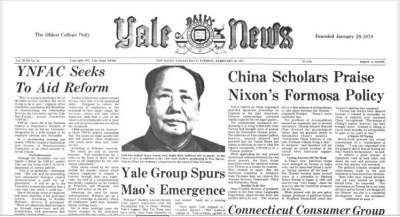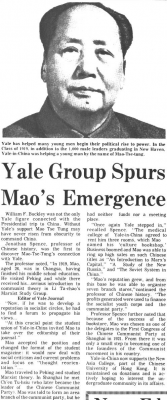TonyGosling
Editor


Joined: 25 Jul 2005
Posts: 18335
Location: St. Pauls, Bristol, England
|
 Posted: Tue Feb 23, 2021 12:49 am Post subject: Yale Skull and Bones Graduates - University of Evil Posted: Tue Feb 23, 2021 12:49 am Post subject: Yale Skull and Bones Graduates - University of Evil |
 |
|
Jonathan Spence, professor of Chinese history, was the first to discover Mao-Tse-Tung’s connection with Yale.
https://psypolitics.org/2020/07/05/the-political-career-of-mao-yale-an d-the-reorientation-of-thought/
The professor noted, “In 1919, Mao, aged 26, was in Changsa, having finished his middle school education. He visited Peking and while there received his…serious introduction to communist theory in Li Ta-chao’s Marxist Study Group.
“Now, if he wanted to develop a reputation in socialist circles, he had to find a forum to propagate his views…
At this crucial point the student union of Yale-in-China invited Mao to take over the editorship of their journal.”
Mao accepted the position and changed the format of the student magazine: it would now deal with social criticism and current problems and focus on “thought reorientation.”….
Mao traveled to Peking and studied Marxist theory. In Shanghai he met Ch’en Tu-hsiu (who later became the leader of the Chinese Communist Party). Mao was told to form an area branch of the Communist party, but he had neither funds nor a meeting place.
“Once again Yale stepped in,” recalled Spence. “The medical college of Yale-in-China agreed to rent him three rooms, which Mao named his “culture bookshop.”
Business boomed and Mao was able to ring up high sales on such Chinese titles as “An Introduction to Marx’s Capital”, “A Study of the New Russia” and “The Soviet System in China”.
“Mao’s reputation grew, and from this base he was able to organize seven branch stores,” continued the professor of Chinese history. “The profits generated were used to finance the socialist youth corps and the communist party.”
The political career of Mao, Yale and the “reorientation of thought” (2020)
https://psypolitics.org/2020/07/05/the-political-career-of-mao-yale-an d-the-reorientation-of-thought/
by Federico Soldani
Italiano
On the Yale Daily News (February 29, 1972), the oldest college newspaper founded in 1878 in Yale, one of the first American universities (1701), on the front page in the central article at the top there is a photo of Mao, the Chinese leader of the “great leap forward”.
As stated in the English Wikipedia entry (access June 7, 2020) dedicated to the Yale-China Association: “Between 1919 and 1920, future Chairman Mao Zedong had several encounters with the school: he edited its student magazine, re-focusing it on “thought reorientation,” and operated a bookshop out of its medical college”.
Below, the text of the Yale Daily News article dated 29 February 1972.
~~~
Yale Group Spurs Mao’s Emergence
[Editor of Yale Journal]
Below the photo of Mao, the following caption:
“Yale has helped many young men begin their political rise to power. In the class of 1919, in addition to the 1,000 male leaders graduating in New Haven, Yale-in-China was helping a young man by the name of Mao-Tse-tung. “
Original article text:
William F. Buckley was not the only Yale figure connected with the Presidential trip to China. Without Yale’s support, Mao Tse Tung may never have risen from obscurity to command China.
Jonathan Spence, professor of Chinese history, was the first to discover Mao-Tse-Tung’s connection with Yale.
The professor noted, “In 1919, Mao, aged 26, was in Changsa, having finished his middle school education. He visited Peking and while there received his…serious introduction to communist theory in Li Ta-chao’s Marxist Study Group.
“Now, if he wanted to develop a reputation in socialist circles, he had to find a forum to propagate his views…
At this crucial point the student union of Yale-in-China invited Mao to take over the editorship of their journal.”
Mao accepted the position and changed the format of the student magazine: it would now deal with social criticism and current problems and focus on “thought reorientation.”….
Mao traveled to Peking and studied Marxist theory. In Shanghai he met Ch’en Tu-hsiu (who later became the leader of the Chinese Communist Party). Mao was told to form an area branch of the Communist party, but he had neither funds nor a meeting place.
“Once again Yale stepped in,” recalled Spence. “The medical college of Yale-in-China agreed to rent him three rooms, which Mao named his “culture bookshop.”
Business boomed and Mao was able to ring up high sales on such Chinese titles as “An Introduction to Marx’s Capital”, “A Study of the New Russia” and “The Soviet System in China”.
“Mao’s reputation grew, and from this base he was able to organize seven branch stores,” continued the professor of Chinese history. “The profits generated were used to finance the socialist youth corps and the communist party.”
Professor Spence further noted that because of the success of the bookstore, Mao was chosen as one of the delegates to the First Congress of the Chinese Communist Party in Shanghai in 1921. From there it was only a small step to becoming one of the founders of the communist movement in his country.
Yale-in-China now supports the New Asia College, part of the Chinese University of Hong Kong. It is maintained on donations and is actively hoping to interest the undergraduate community in its affairs.”
| Description: |
|
| Filesize: |
174.4 KB |
| Viewed: |
220 Time(s) |

|
| Description: |
|
| Filesize: |
618.1 KB |
| Viewed: |
221 Time(s) |

|
_________________
www.lawyerscommitteefor9-11inquiry.org
www.rethink911.org
www.patriotsquestion911.com
www.actorsandartistsfor911truth.org
www.mediafor911truth.org
www.pilotsfor911truth.org
www.mp911truth.org
www.ae911truth.org
www.rl911truth.org
www.stj911.org
www.v911t.org
www.thisweek.org.uk
www.abolishwar.org.uk
www.elementary.org.uk
www.radio4all.net/index.php/contributor/2149
http://utangente.free.fr/2003/media2003.pdf
"The maintenance of secrets acts like a psychic poison which alienates the possessor from the community" Carl Jung
https://37.220.108.147/members/www.bilderberg.org/phpBB2/ |
|


